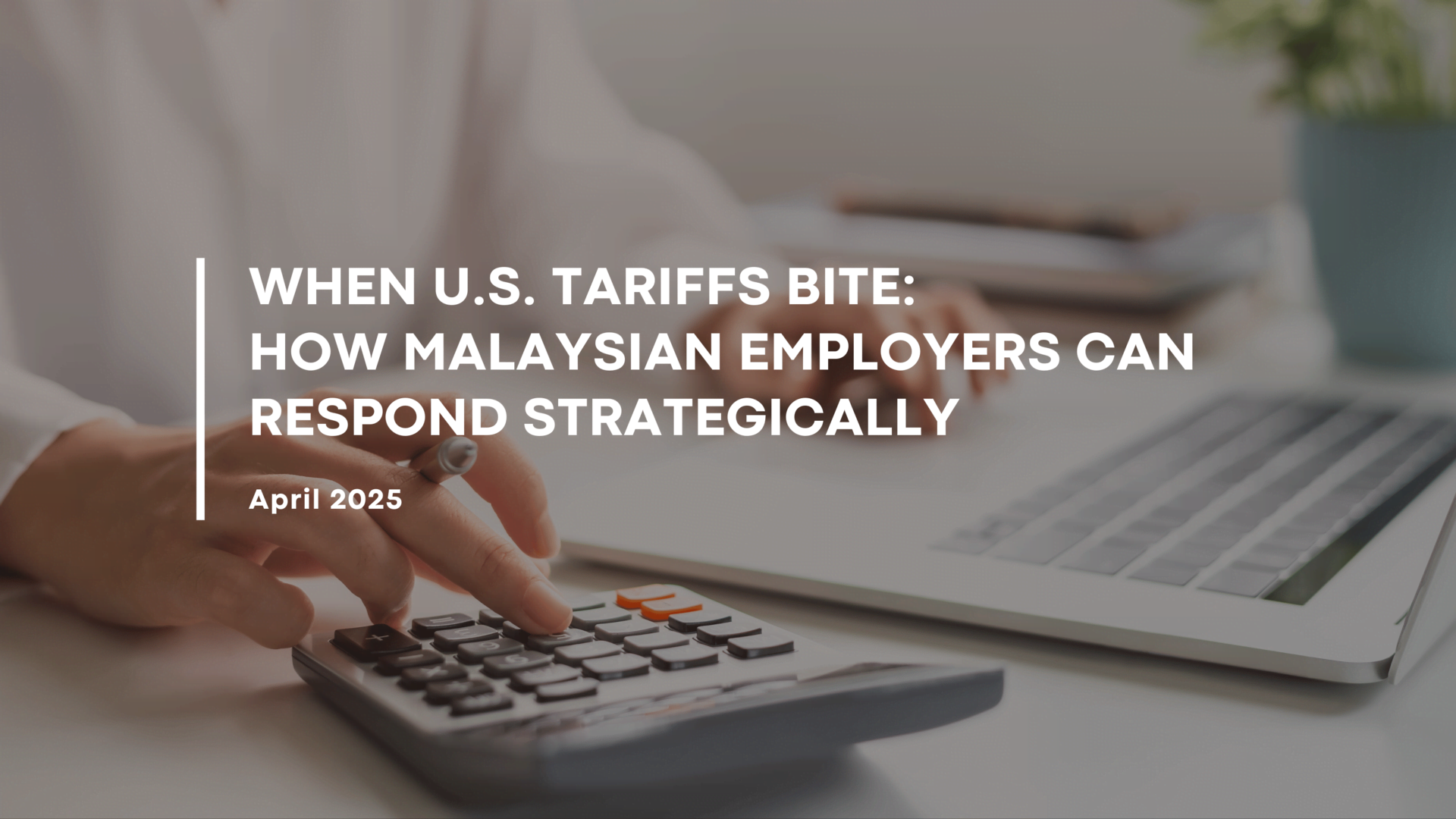The global trading landscape shifted dramatically in April 2025, with the United States announcing sweeping new tariffs. For Malaysian businesses, the ripple effect may be felt not just in profit margins, but in employment decisions. This article explores how employers can respond lawfully and strategically.
A. Introduction
On 2 April 2025, the United States announced sweeping tariffs affecting imports from nearly every country worldwide, including Malaysia. Beginning 5 April 2025, all Malaysian products shipped to the US became subject to a minimum 10% tariff. From 9 April 2025, most of these products faced an increased tariff rate of 24%, with limited exemptions.
On 9 April 2025, President Trump announced a 90-day suspension of key aspects of his Reciprocal Tariff Policy, originally unveiled on 2 April 2025. In response to Chinese countermeasures, President Trump escalated tariffs on Chinese goods, raising them from 34% to 84%, and subsequently to 125%. Additionally, the previously duty-free de minimis treatment for certain goods from mainland China and Hong Kong was revoked. These goods are now subject to either a 120% ad valorem duty or a specific duty of US$100 or US$200, depending on the item.
Tariffs announced on 8 April 2025 targeting specific countries excluding China have been suspended for 90 days. However, the global base tariff of 10% remains in effect.
B. Impact on Malaysian Business
As an open trading nation, Malaysian government views the unilateral imposition of reciprocal tariffs as a serious threat to the global trade and investment system. These actions undermine the core principles of free, non-discriminatory, and predictable trade, as upheld by the World Trade Organization (WTO)
Ironically, the WTO was established through the General Agreement on Tariffs and Trade (GATT) in 1948 by countries including the United States itself. As one of the United States’ key trading partners in the region and a significant recipient of US foreign direct investment, Malaysian government foresees considerable mid- to long-term challenges arising from these tariffs.
Although certain sectors – particularly semiconductors, Malaysia’s top export to the U.S.—have received limited exemptions, many industries such as textiles, furniture, rubber, and plastics are likely to face heavy setbacks due to the tariffs
C. Employment Considerations Amid Tariffs
Malaysia’s unemployment rate is expected to remain stable despite global market jitters triggered by recent tariff announcements from the United States. The newly imposed U.S. tariffs may pressure businesses – especially those in the export and supply chain sectors – to consider cost-cutting measures, including restructuring or downsizing. Companies with fixed-price contracts may find their profit margins shrinking significantly.
Businesses may have no choice but to absorb the additional costs, renegotiate contracts, or increase prices – each of which may reduce global competitiveness. Citing tariffs alone as a reason for retrenchment is unlikely to be sufficient in Malaysia. The Industrial Court requires that any retrenchment be genuine, necessary, and fairly executed. Realising that being retrenched and thus terminated from employment can be both traumatic and disruptive, in Malaysia, the Code of Conduct for Industrial Harmony illustrated that there should be prior consultation with the employee concerned and retrenchment should be only as a last resort.
Key employment strategies that Malaysian employers may consider in managing workforce challenges linked to the current tariff landscape.
- To manage costs while preserving jobs, employers may consider implementing reduced working hours, shorter workweeks, or temporary pay cuts. However, these changes affect fundamental terms of employment and generally require express employee consent, especially if not already permitted under the employment contract.
- Employers may also consider redeploying employees across departments or business functions. However, significant changes to job scope, reporting lines, or work location without justification or consent may amount to a breach of contract.
- Employers may also consider redeploying employees across departments or business functions. However, significant changes to job scope, reporting lines, or work location without justification or consent may amount to a breach of contract.
In Dynacraft Industries Sdn. Bhd. v. Kamaruddin bin Kana Mohd Sharif & Ors [2012] 9 CLJ 21, the Federal Court explained the LIFO principle as follows:
“It is an accepted principle of industrial law that in ordering retrenchment ordinarily the management should commence with the latest recruit, and progressively retrench employees higher up in the list of seniority. But the rule is not immutable, and for valid reasons may be departed from.”
Employers who fail to follow proper retrenchment procedures risk claims for unfair dismissal, which can lead to costly compensation or even reinstatement by the Industrial Court.
D. Conclusion
While U.S. tariffs are external shocks, they require Malaysian employers to make internal decisions with legal care and strategic foresight. Whether opting for job-sharing, temporary redeployment, or retrenchment, employers must act with transparency, procedural fairness, and legal compliance.
Employers are strongly encouraged to consult legal counsel early in the process. U.S. tariffs should not be used as a blanket justification for termination. The Industrial Court will examine whether all proper procedures and principles of fairness have been adhered to.
© TSL Legal
This article is intended to provide general information only and does not constitute legal advice. It should not be used as a substitute for professional legal consultation. We recommend seeking legal advice before making any decisions based on the information available in this article. TSL Legal fully disclaims responsibility for any loss or damage which may result from relying on this article.
Further Information
If your business may be affected by the economic fallout of these tariff changes and requires tailored advice on workforce restructuring or industrial relations compliance, please contact the following representative for further assistance:

